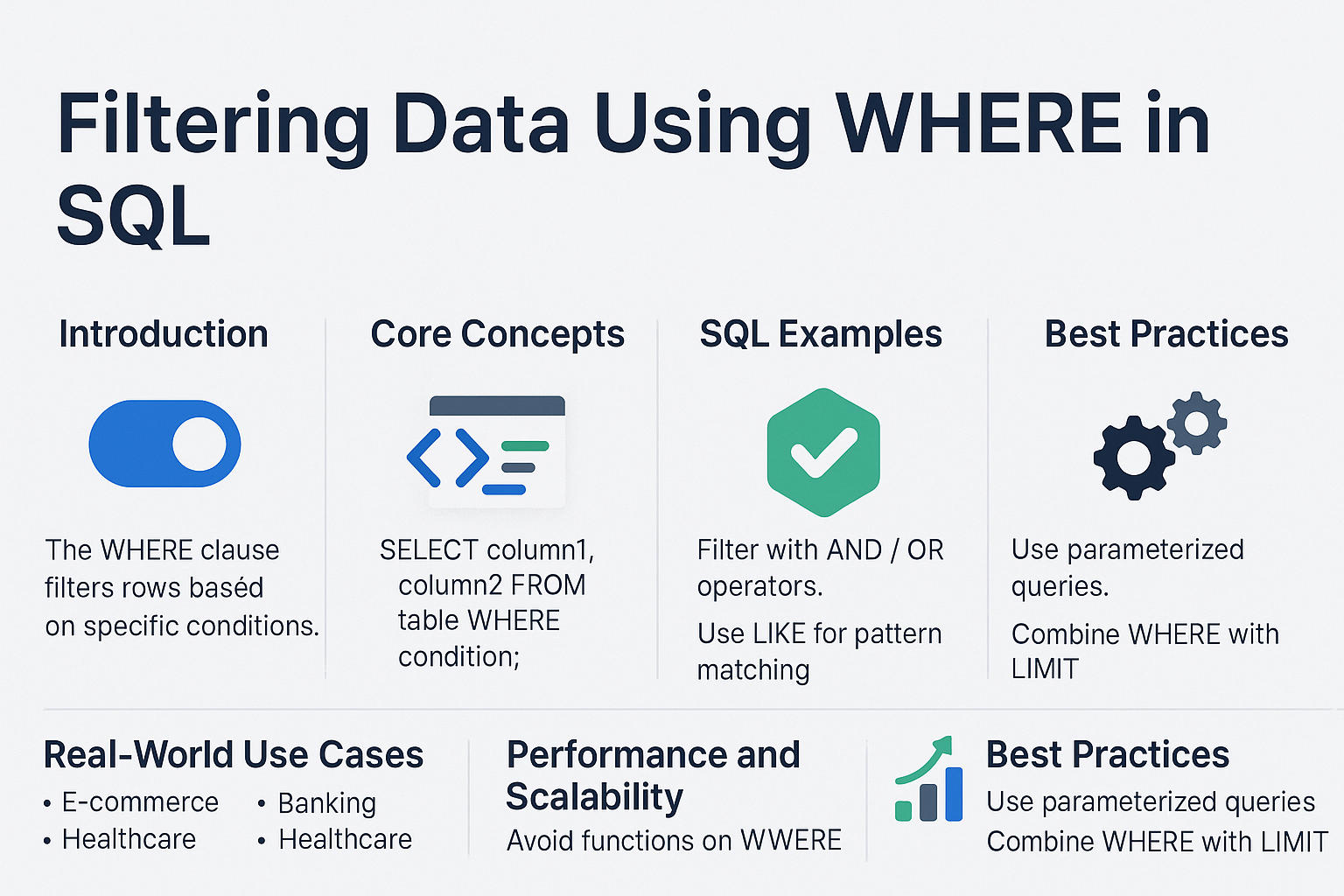Introduction
The WHERE clause in SQL allows you to filter rows based on specific conditions, making it one of the most powerful tools for querying data. It helps you retrieve only the records you need instead of fetching entire tables.
Why It Matters
- Improves query precision.
- Reduces resource usage by fetching targeted data.
- Essential for reporting, analytics, and application logic.
Real-world analogy:
Think of a WHERE clause as a supermarket filter. Instead of buying everything, you pick only the items matching your shopping list. Similarly, WHERE filters rows matching your criteria.
Core Concepts
Basic Syntax
SELECT column1, column2
FROM table_name
WHERE condition;
Common Operators
- =, <>, >, <, >=, <= – Comparison operators.
- AND / OR – Combine multiple conditions.
- BETWEEN – Range filtering.
- LIKE – Pattern matching.
- IN – Match against a list of values.
- IS NULL / IS NOT NULL – Check for NULL values.
SQL Examples
Simple Equality Filter
SELECT name, email
FROM customers
WHERE customer_id = 1;
Using AND/OR
SELECT name, email
FROM customers
WHERE signup_date > '2025-01-01' AND status = 'ACTIVE';
Pattern Matching with LIKE
SELECT name
FROM customers
WHERE email LIKE '%@gmail.com';
Range Filtering with BETWEEN
SELECT name, signup_date
FROM customers
WHERE signup_date BETWEEN '2025-01-01' AND '2025-06-30';
Filtering NULL Values
SELECT name
FROM customers
WHERE phone IS NULL;
Real-World Use Cases
- E-commerce: Filtering orders by date range or status.
- Banking: Retrieving transactions above a threshold.
- Healthcare: Fetching patients with upcoming appointments.
Common Mistakes and Anti-Patterns
- Using SELECT * with WHERE: Fetches unnecessary columns.
- Not indexing filtered columns: Causes slow queries.
- Incorrect operator precedence: Leads to unexpected results.
Performance and Scalability Implications
- Indexing columns used in WHERE improves performance.
- Avoid applying functions directly on indexed columns (e.g.,
WHERE LOWER(name)). - Use LIMIT with WHERE for pagination.
RDBMS Comparison
| Feature | PostgreSQL | MySQL | Oracle |
|---|---|---|---|
| Pattern Matching | ILIKE for case-insensitive | LIKE only (use collation) | LIKE and REGEXP |
| NULL Handling | IS NULL / IS NOT NULL | Same | Same |
| Execution Plan | EXPLAIN ANALYZE | EXPLAIN | EXPLAIN PLAN |
Best Practices & Optimization Tips
- Always use appropriate indexes on frequently filtered columns.
- Use parameterized queries to prevent SQL injection.
- Avoid wildcard at the start of LIKE patterns (
%abc) for better performance. - Combine WHERE with LIMIT for efficient data retrieval.
When to Use vs When to Avoid
Use WHERE When:
- Filtering data based on conditions.
- Retrieving subsets of large datasets.
Avoid Complex WHERE When:
- Business logic is better handled in the application layer.
- Filtering on unindexed columns in massive datasets.
Conclusion & Key Takeaways
The WHERE clause is critical for precise and efficient SQL queries. Mastering it helps you build optimized, secure, and maintainable database operations.
Key Points:
- WHERE filters rows based on conditions.
- Combine with operators and indexes for powerful queries.
- Avoid inefficient patterns for better scalability.
FAQ
1. What is the purpose of the WHERE clause?
To filter rows based on conditions.
2. Can I use WHERE without SELECT?
Yes, with UPDATE and DELETE statements.
3. What is the difference between WHERE and HAVING?
WHERE filters rows before aggregation; HAVING filters after aggregation.
4. Can I use functions in WHERE?
Yes, but it may affect index usage.
5. Is WHERE case-sensitive?
Depends on collation and RDBMS (PostgreSQL has ILIKE).
6. Can I filter by multiple conditions?
Yes, using AND/OR operators.
7. Does WHERE improve performance?
It reduces returned rows but indexing is key for speed.
8. How do I check for NULL values?
Use IS NULL and IS NOT NULL.
9. Can I use subqueries in WHERE?
Yes, for dynamic filtering.
10. What is a parameterized WHERE clause?
A query that uses placeholders to safely insert values, preventing SQL injection.
